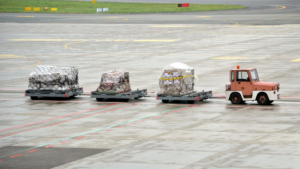Temporary Duty-Free Treatment of Infant Formula
This message is being issued to provide updated guidance on HR 8351, the Formula Act. Signed by the President on July 22, 2022, the Formula Act temporarily suspends duty on imports of certain infant formula products. The Office of Trade has updated the Harmonized Tariff Schedule of the United States (HTSUS) file in the Automated Commercial Environment (ACE) to account for this legislation.
U.S. Customs and Border Protection (CBP) will provide duty-free treatment of the eligible infant formula products entered or withdrawn from warehouse for consumption from July 22, 2022 through December 31, 2022. Duty-free treatment is limited to certain infant formula products classified under the designated United States Harmonized Tariff Schedule (HTS) numbers. The eligible infant formula products will not be subject to any additional safeguard duties that may be imposed under subchapter IV of Chapter 99 of the HTS, or any other import quotas, tariff-rate quotas, additional duties, or any other duties, fees, exactions, or charges that otherwise would apply to such articles.
Source: US Customs and Border Protection
Cyber-attacks on one of the world's busiest ports have nearly doubled since the start of the Covid pandemic.
The number of monthly attacks targeting the Port of Los Angeles is now around 40 million, the port's executive director Gene Seroka told the BBC.
Los Angeles is the busiest port in the western hemisphere, handling more than $250bn (£210bn) of cargo every year.
The threats are believed to come mainly from Europe and Russia, and aim to disrupt the US economy, Mr Seroka said.
"Our intelligence shows the threats are coming from Russia and parts of Europe. We have to stay steps ahead of those who want to hurt international commerce," he told the BBC's World Service.
Seaports move billions of dollars in goods every year, making them a unique target for cyber-criminals.
They face daily ransomware, malware, spear phishing and credential harvesting attacks, with the aim of causing as much disruption as possible and slowing down economies.
Teaming up with the FBI
The Port of Los Angeles is now working with the Federal Bureau of Investigation's cyber-crime team to prevent attacks and improve cyber-security.
The port has invested millions of dollars in cyber-protection, developing one of the world's first Cyber Resilience Centers, which is part of the FBI.
"We must take every precaution against potential cyber-incidents, particularly those that could threaten or disrupt the flow of cargo," said Mr Seroka.
The Cyber Resilience Center provides enhanced intelligence gathering and heightened protection against cyber-threats within the maritime supply chain.
It is a hub for the port to receive, analyze and share information with those who operate on the dock, such as cargo handlers and shipping lines.
Supply chain blockages
During the pandemic global supply chains slowed down as lockdowns closed factories and workers were forced to stay at home.
The strain on supply chains has since eased, Mr Seroka said. In January 2022 there were 109 container ships queuing for more than two days to get into the Port of Los Angeles. Today there are around 20 waiting to dock.
But Mr Seroka believes the blockages won't clear completely until 2023. "There's so much cargo coming in and not enough space," he said.
"The past two years have proven the vital role that ports hold to our nation's critical infrastructure, supply chains and economy. It's paramount we keep the systems as secure as possible," he added.
Source: BBC
AB 5 - What’s on the Line?
Dockworkers at the Oakland port have now joined truckers in protest of the implementation of California’s Assembly Bill 5. This has effectively closed down the port's operations, only exacerbating the current backlog of containers dwelling there.
In a statement released on July 20th, Danny Wan, Executive Director, Port of Oakland said: “We understand the frustration expressed by the protestors at California ports …But prolonged stoppage of port operations in California for any reason will damage all the businesses operating at the ports and cause California ports to further suffer market share losses to competing ports.” He added: “Truckers are vital to keeping goods moving …We trust that implementation of AB5 can be accomplished in a way that accommodates the needs of this vital part of the supply chain.”
Under AB 5, independent owner-operators will be reclassified as motor carrier employees giving them the ability to form unions. The state is providing resources to help truckers comply with the controversial law.
More than 70 trade associations representing wide-ranging supply chain interests have sent a letter to California Governor Gavin Newsom asking him to issue an executive order to temporarily pause enforcement of the state’s AB 5 contractor law.
Source: AJOT
New Beginnings
China just unveiled its first-ever professional cargo hub airport, reportedly the first of its kind in all of Asia.
A Boeing 767-300 cargo plane took off to mark the start of operations at the airport, which features a 23,000 sq m cargo terminal, a nearly 700,000 sq m freight transit center and two runways to improve air freight transport efficiency.
The airport has opened two cargo routes to Shenzhen and Shanghai, and is scheduled to add international routes connecting with Osaka in Japan and Frankfurt in Germany within this year.
It is expected to open around 10 international cargo routes and 50 domestic routes by 2025, with air cargo and mail throughput reaching 2.45m tonnes.
The project team behind the airport have applied for more than 70 patents and copyrights for new technologies, such as 5G, big data, cloud computing and artificial intelligence, for making the new airport safer, greener, and smarter.
The new cargo airport will hopefully help alleviate some of the pressure at sea caused by COVID disruptions.
Source: Air Cargo News





